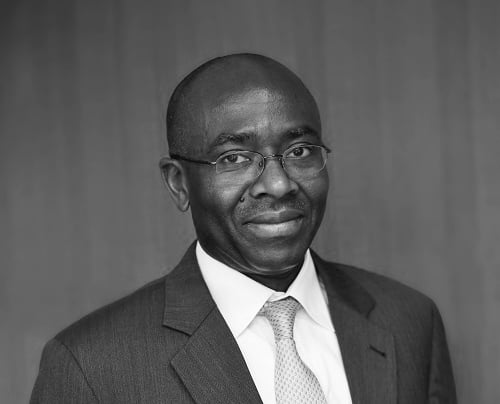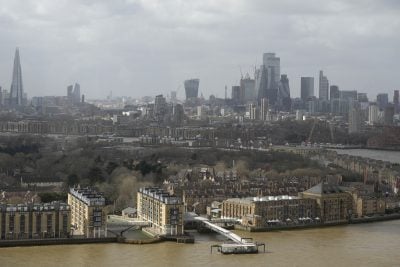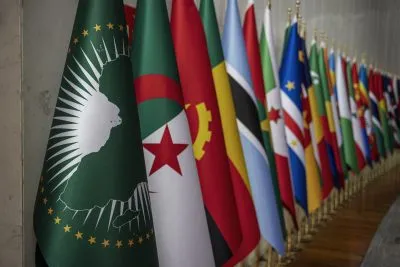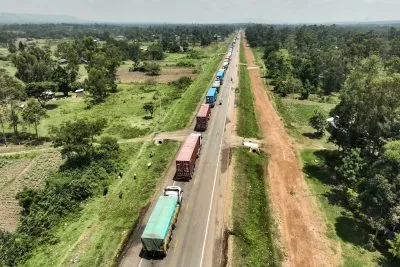Following the World Bank meetings in October, we spoke to Dr Hippolyte Fofack, chief economist at the African Export-Import Bank (Afreximbank), about the current global economic climate and what policy makers and development commentators meant when they say that the current global financial architecture is not fit for purpose.
As ministers of finance convene in Washington for IMF/World Bank Spring meetings, his answers are still highly relevant.
African Business: Does the current global turbulence worry you when looking at African economies?
Dr Hippolyte Fofack: We should all be concerned about the ongoing economic turbulence and challenging global environment, particularly in the context of diminishing international co-operation and increasing risks of fragmentation. The contest for international leadership has heightened global volatility and economic uncertainty, potentially setting the stage for another policy-induced economic crisis, with Western-led economic and financial sanctions against Russia derailing the incipient recovery from the Covid-19 pandemic downturn.
World growth forecasts for 2022 have been revised downward sharply, and prospects for 2023 are not any better. Global economic output is forecast to decelerate to 3.2% this year, down from 6.1% in 2021. Forecasts from the International Monetary Fund (IMF) point to an even growth rate next year. Inflation is at multidecade highs on both sides of the Atlantic, where the risk of stagflation has risen sharply, especially following the yield curve inversion in the US last month.
Tighter global financing conditions and aggressive rate hikes by systemically important central banks in response to surging inflation are exacerbating macroeconomic management challenges in developing economies. Those measures are also increasing the fiscal incidence of sovereign debt at a time when governments are grappling with a shrunken policymaking space post-pandemic.
Although Africa’s economy is projected to continue expanding in the near term, the outlook is fraught with risks heavily tilted to the downside. The post-pandemic economic environment, aggravated over the last several months by incredible geopolitical tensions, is set to pose another major test for the region.
Yet we have oil producers, commodity exporters, the biggest producer of phosphates and a large player in fertilisers, all based on the continent.
This is the paradox of African development: how has the continent – which is sitting on large reserves of natural gas used to produce nitrogen-based fertilisers and phosphate rock used to produce phosphate-based fertilizers – remained so dependent on imported fertilisers? And more generally, how can a continent so rich in natural resources be the world’s poorest? According to most recent estimates, more than two-thirds of people living in extreme poverty globally last year were in sub-Saharan Africa.
Africa is a major importer of fertilisers and the costs of this incongruity have been tremendous, and increasingly observable in other sectors. For instance, several oil-producing African countries import refined petroleum, owing to their limited or wholly-absent refining capabilities. The region’s import bill – a vestige of the colonial development model of resource extraction, under which Africa participates in global value chains through forward, rather than backward, activities – has been a terrible drain on forex reserves.
More recently, the pandemic spotlighted Africa’s overdependency on imports of manufactured goods, as the region struggled to secure personal protective equipment, test kits and ventilators. The good news is that conditions are ripe for the transformation of African economies and development of more robust regional value chains. Besides the food security and national security argument made even more obvious by the two overlapping crises, the demographic trends are such that the continued overreliance on imports is no longer sustainable and will increase the frequency of balance of payment crises, sending even more countries to the IMF.
The African Continental Free Trade Area (AfCFTA) – which removes barriers that have segmented markets in the region and made it difficult for companies to spread investment risk and take advantage of competitiveness and productivity gains associated with inherent economies of scale – has the potential to catalyse African industries. It has already facilitated rising investment and expedited the injection of patient capital, both towards the expansion of existing processing capacity and the establishment of new manufacturing capabilities across the region.
It’s been said that the current global financial architecture and post-1945 institutions, what we loosely call the Bretton Woods system, are not fit for purpose when it comes to low- and middle-income African countries. What do you suggest?
The global financial architecture that emerged from the 1944 Bretton Woods Conference was conceived by the wealthiest nations, and it has served them well. It has been adjusted on rare occasions but remains unfit for purpose and has undermined the process of global income convergence. Major reform is necessary if we are to avoid fragmentation.
The dollar’s dominance was cemented after WWII, making the US the world’s banker and pre-eminent supplier of safe assets. Over time, this structure’s imbalances have exacerbated macroeconomic challenges in developing countries, feeding into the “perception premiums” and balance of payments pressures that have largely excluded the Global South from international capital markets.
The exorbitant privilege afforded to advanced economies by issuing global reserve currencies has skewed the distribution of international liquidity. Consequently, most developing countries without large forex reserves are unable to sustain the value of their currency, meet international obligations or reassure investors. Time and time again, African countries are hit by negative terms of trade shocks that adversely affect forex reserves and drive them to the IMF for balance of payments support.
Similar imbalances exist in monetary policy, with decisions taken by a handful of systemically important central banks having global repercussions. Monetary tightening by these institutions creates aftershocks for developing countries via currency depreciation, diminished borrowing overall, rising borrowing costs and capital outflows.
Per the Institute of International Finance, net non-resident portfolio outflows from emerging and developing economies amounted to around US$18bn in March [2022], when the US Federal Reserve began aggressively raising its policy rate.
Reflecting on the myriad negative externalities of US monetary policy, John Connally, President Nixon’s treasury secretary, famously retorted to his fellow G10 ministers in 1971: “The dollar is our currency, but it’s your problem.” Attempts to alleviate that problem have been undercut by historical inequalities.
One such effort concerns the special drawing right (SDR), the international reserve asset created in 1969 by the IMF in anticipation of future crises. It began life as a means to assuage liquidity constraints, but in practice further reinforced inequality. Advanced economies were issued the largest shares of SDRs, in spite of not needing them and being suppliers of reserve currencies. SDRs are distributed to IMF member countries as a proportion of their quotas, which are themselves burdened by historical imbalances and in desperate need of reform. For instance, Africa, with a population of 1.4bn, has fewer quotas combined than France and Italy, with a combined population of around 127m.
Current events suggest the transition towards a multipolar monetary system that takes into account the diffusion of global economic forces over the last several decades will be fraught. As the current cycle of global financial tightening plays out, the reallocation of unused SDRs to disadvantaged nations would go a long way towards assuaging liquidity constraints associated with balance of payments pressures. It would also increase countries’ fiscal space and lessen their exposure to exchange rate volatility.
Likewise, broadening access to bilateral swap arrangements – a common tool among major central banks to temporarily increase access to forex liquidity – to more developing countries will help prevent short-term liquidity crises from metastasising into solvency crises. The IMF could help unlock these swap lines by providing guarantees that mitigate counterparty risk or by offering its own short-term swap facilities.
But the sustainable solution lies in correcting the historical birth defect of the international monetary system that is still controlled by just a handful of countries. The world has changed immeasurably since 1944. Democratising the issuance of reserve currencies is crucial if we are to restore trust in the international financial system. After the wave of decolonisation following WWII, it is high time to decolonise our global financial architecture.
What are your thoughts on establishing an African IMF?
Establishing a regional monetary fund to promote exchange rate stability and mitigate volatility in member states’ balance of payments has been floated before. The Asian Monetary Fund offers an instructive example. Although never transcending the idea stage, it has an interesting history relating to the 1997 Asian financial crisis, which was triggered by speculative attacks on currencies of countries that were highly vulnerable to short-term capital flows. These governments powerlessly witnessed the collapse of their currencies after running out of foreign reserves.
That calamity, which resulted in tremendous hardship, with most countries across the region seeing a very sharp economic downturn and significant increase in poverty rates, could have been averted if a lender of last resort had stepped in to mitigate currency and maturity mismatches. One issue that motivated discussions around an Asian Monetary Fund was that the IMF’s rescue packages were ‘too little too late’ and came with excessively harsh conditions.
Washington opposed tapping the financial wherewithal of external surplus countries in the Association of Southeast Asian Nations (Asean) to pool regional forex reserves under what would have been the Asian Monetary Fund. Instead, the region later established the Chiang Mai Initiative (CMI), a multilateral currency swap arrangement between Asean, China, Japan and South Korea. At its inception in 2010 the CMI drew from a $120bn forex reserve pool, which was expanded in 2014 to $240bn. Together China, Japan and South Korea, the three largest economies account for 80% of the total contribution.
Support from similar regional institutions will become increasingly important as complements to IMF assistance, especially in a highly competitive geopolitical environment where Fund resources have not kept up with the growth of world output. In the African context, such an entity may also help to address onerous perception premiums, acting as collective insurance for a region where credit ratings have been divorced from growth prospects.
As with the CMI, the region’s largest economies (Nigeria, South Africa and Egypt) should champion the initiative both in words and in deeds. Aggressively diversifying their sources of growth and trade to build a sizable foreign reserves war chest will be the first and most important step in that direction.
We see some $5bn per month, possibly more now, going from the West to help Ukraine. We read of a $170bn UK government plan to cap energy bills; a $70bn backstop in Germany to support energy companies. There’s money out there. Should African countries expect more assistance from richer nations? Or is it time to call it quits and develop our own mechanisms?
It is quite remarkable, the many billions and trillions dispensed by advanced economies and the contrast with the chronic shortage of financing in most developing countries. In the Global South, a small fraction of that amount could make a massive difference for growth, debt sustainability and resilience to climate change.
Honouring the commitment made by these countries in Copenhagen over a decade ago to channel US$100bn annually to developing countries to help them deal with climate change mitigation and adaptation has remained a challenge, despite the global benefits of such a move.
And of course, this new fiscal support comes soon after the same countries deployed trillions in fiscal and monetary intervention during the Covid-19 downturn. This massive increase in spending has dramatically inflated high-income countries’ budget deficits and raised debt to unprecedented levels.
Their combined sovereign debt now represents 122% of GDP, against 65% on average in developing economies. Interestingly, these huge gaps in debt ratios have not led to narrower spreads, and African countries remain burdened with growth-crushing and default-driven borrowing rates. Deficits matter less for countries that enjoy the exorbitant privilege of issuing reserve currencies and more for the ones that do not. These are the manifestations of some of the entrenched inequalities associated with the current international financial architecture.
But the solution is not to call it quits – doing so will lead only to a disordered fragmentation of the global economy, with dangerous consequences for growth and development. What we must pursue instead is urgent reform and democratisation of the international financial system from within to address its intransigent inequalities and level the global monetary playing field.
We must redesign global financial architecture, says Barbados PM Mia Mottley
‘It would be myopic for the international community not to invest in Africa’ – IMF Africa director
What can next president of World Bank learn from AfDB and AIIB?
Want to continue reading? Subscribe today.
You've read all your free articles for this month! Subscribe now to enjoy full access to our content.
Digital Monthly
£8.00 / month
Receive full unlimited access to our articles, opinions, podcasts and more.
Digital Yearly
£70.00 / year
Our best value offer - save £26 and gain access to all of our digital content for an entire year!

 Sign in with Google
Sign in with Google 



